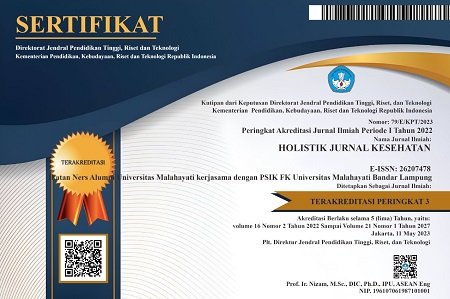Efektifitas aromaterapi peppermint terhadap mual muntah pada pasien kanker payudara yang menjalani kemoterapi
Abstract
The effectiveness of peppermint aromatherapy on nausea and vomiting among breast cancer patients undergoing chemotherapy
Background: Breast cancer is a type of cancer and is one cause of death in the world. Chemotherapy is the use of chemical agents to control and destroy cancerous cells. Chemotherapy can induce nausea and vomiting, resulting in discomfort. One intervention that makes patients feel comfortable is giving peppermint aromatherapy.
Purpose: To determine the effectiveness of peppermint aromatherapy on nausea and vomiting among breast cancer patients undergoing chemotherapy.
Method: A quasi-experimental pretest-posttest group design, with a purposive sampling method of collecting samples. The study sample was 34 breast cancer patients who underwent chemotherapy. The sample divided into 2 groups as intervention & control groups. Measurement of nausea and vomiting used the Rhodes Index Nausea Vomiting & Retching (INVR) instrument.
Results: Finding by the Man Whitney test, it showed that there was a difference in the scores for nausea and vomiting between the intervention group and the control group (p value = 0.008).
Conclusion: Peppermint aromatherapy is effective in reducing nausea and vomiting among breast cancer patients undergoing chemotherapy.
Keywords: Breast cancer; Chemotherapy, Nausea; Vomiting; Peppermint aromatherapy
Pendahuluan: Kanker payudara merupakan salah satu jenis kanker dan menjadi salah satu penyebab kematian di dunia. Kemoterapi merupakan penggunaan agen kimiawi untuk mengontrol dan menghancurkan sel yang bersifat kanker.Kemoterapi dapat menginduksi mual dan muntah mengakibatkan ketidaknyamanan. Salah satu intervensi yang membuat pasien merasa nyaman adalah dengan pemberian aromaterapi pepermint.
Tujuan: Mengetahui efektifitas aromaterapi pepermint terhadap mual muntah pada pasien kanker payudara yang menjalani kemoterapi.
Metode : Penelitian quasi experimental pretest-posttest group design, dengan metode pengumpulan sampel secara purposive sampling. Sampel penelitian sebanyak 34 pasien kanker payudara yang menjalani kemoterapi. Sampel terbagi atas dua kelompok; intervensi & kontrol. Pengukuran mual muntah menggunakan instrumen Rhodes Index Nausea Vomiting & Retching ( INVR).
Hasil : Dengan menggunakan man whitney test menunjukkan bahwa terdapat perbedaan skor mual muntah antara kelompok intervensi dengan kelompok kontrol (p value = 0,008).
Simpulan: Aromaterapi peppermint efektif menurunkan mual muntah pada pasien kanker kayudara yang menjalani kemoterapi.
Keywords
References
Alligood, R. M. (2014). Nursing theorists and their work (8th ed). St. Louis, Missouri : Elsevier Inc.
Ashoor, A., Nordman, J. C., Veltri, D. Yang, K. H. S., Shuba, Y., Kury, L. A., Sadek, B., Howart, F. C., Shehu, A., Kabbani, N., & Oz, M. (2013). Menthol inhibits 5-HT3 receptor-mediated current. The Journal of Pharmacology and Experimental Therapeutics, 347, 398 – 409
Black, J. M., & Hawks, J. H. (2014). Keperawatan Medikal Bedah; Manajemen klinis untuk hasil yang diharapkan.
Chan, H. S., & Correia, J. A. (2014). Nabilone versus prochlorperazine for control of cancer chemotherapy-induced emesis in children: a double-blind, crossover trial. Pediatrics, 79, 946-52
Eghbali, M., Varaei, S., Yekaninejad, M. S., Mohammadzadeh, F., & Shahi, F. (2017). To What Extend Aromatherapy with Peppermint Oil Effects on Chemotherapy Induced Nausea and Vomiting in Patient Diagnosed with Breast Cancer? A Randomized Controlled Trial. J. Hematol. Thromboembolic Dis, 5(06).
Global Cancer Observatory (GCO) (2019). Interational Agency for Researchon Cancer (IARC). Indonesia source : Globocan 2018
Guyton, A. C., & Hall, J. E. (2012). The body fluids and kidneys. Textbook of medical physiology, 6, 339.
Hawkins, R. & Grunberg, S. (2009). Chemotherapy-induced nausea and vomiting: challenges and opportunities for improved patient outcomes. Clinical Journal of Oncology Nursing, 13, 54-64. doi:10.1188/09.CJON.54-64.
Janelsins, M. C., Tejani, M. A., Kamen, C., Peoples, A. R., Mustian, K. M., & Morrow, G. R. (2013). Current pharmacotherapy for chemotherapy-induced nausea and vomiting in cancer patients. Expert opinion on pharmacotherapy, 14(6), 757-766.
Kamble, R.N., Mehta, P.P. & Shinde, V.M. (2014). Aromatherapy As Complementary And Alternative Medicine-Systematic Review. World Journal of Pharmaceutical Research, 3,144-160.
Kasiati, K. (2017). Aromatherapy and Acupressure Combination May Reduce Nausea Vomiting Response (Effect of Chemotherapy) to Cervical Cancer Clients. IOSR Journal of Nursing and Health Science, 6, 2. doi:10.9790/1959-0602020915.
Kementerian Kesehatan Republik Indonesia. (2018). Riskesdas: angka kejadian 10 penyakit di indonesia. Retrieved from https://www.litbang.kemkes.go.id/laporan-riset-kesehatan-dasar-riskesdas/
Kowalak, J. P., Welsh, W., & Mayer, B. (2017). Buku ajar patofisiologi. Jakarta: EGC, 233.
Ling, W.Y. (2015). Effectiveness of aromatherapy in relieving postoperative nausea and vomiting for adult patients in post-anesthesia care unit (PACU).
Mustian, K. M., Devine, K., Ryan, J. L., Janelsins, M. C., Sprod, L. K., Peppone, L. J., & Morrow, G. R. (2011). Treatment of nausea and vomiting during chemotherapy. US oncology & hematology, 7(2), 91.
Nair, M., & Peate, I. (Eds.). (2013). Fundamentals of applied pathophysiology: an essential guide for nursing and healthcare students. John Wiley & Sons.
National Comprehensive Cancer Network. (2017). NCCN Guidelines Insight : Antiemesis version 2.2017. Journal of the National Comprehensive Cancer Network 15 (7): 883-893. Doi : 10.6004/jnccn.2017.0117
Neeraj, T., Prakash, A., & Seema, Y. (2013). Antimicrobial activity and medicinal values of essential oil of mentha piperata L. International Journal of Engineering and Innovative Technology, 2, 214-218.
Neylon, E. A., Butzen, E. L., Converse, J. L., Cook, V. S., Halsema, K. A., Koomen, S. M., & Sherwood, K. (2016, May). Updates in Chemotherapy-Induced Nausea and Vomiting: The Oncology Nurse and Oncology Nurse Practitioner's Perspectives. In Seminars in Oncology Nursing (Vol. 32, No. 2, p. 183). WB Saunders.
Rita, P. & Animesh, D. K. (2011). An updated overview on peppermint (Metha Piperita L. ). International Research Journal Of Pharmacy, 2, 1-10. Rhodes, V. A. & McDaniel, R. W. (2001). Nausea, vomiting, and retching:complex problems in palliative care. A Cancer Journal for Clinicians,
Sali, A. & Vitetia, L. (2007). Peppermint and the gut. Medicine Today, 8, 67-69.
Sari, R. I., & Hartoyo, M. (2015). Pengaruh Aromaterapi Peppermint terhadap Penurunan Mual Muntah Akut pada Pasien yang Menjalani Kemoterapi di SMC RS Telogorejo
Sherwood, L. (2020). Fisiologi manusia dari sel ke sistem.
Stea, S., Beraudi, A., & Pasquale, D.D. (2014). Essential Oils for Complementary Treatment of Surgical Patients: State of the Art. Hindawi Publishing Corporation, 2014,6.
DOI: https://doi.org/10.33024/hjk.v15i1.3313
Refbacks
- There are currently no refbacks.
Copyright (c) 2021 Holistik Jurnal Kesehatan

This work is licensed under a Creative Commons Attribution-NonCommercial 4.0 International License.














